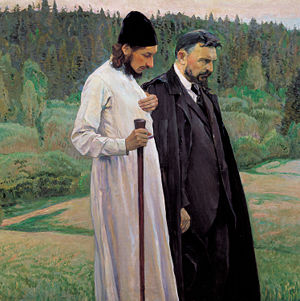 I recently picked up a book I'm really excited about called Naming Infinity. The subtitle sums up why I am so excited: "A True Story of Religious Mysticism and Mathematical Creativity."
I recently picked up a book I'm really excited about called Naming Infinity. The subtitle sums up why I am so excited: "A True Story of Religious Mysticism and Mathematical Creativity."Seriously, does it get any more fascinating than that?
I just read the first chapter, which sets the stage in early 20th century Russia, at the intersection of a religious dispute in Eastern Orthodoxy and a mathematical controversy in Europe.
At issue in the Russian Orthodox Church was a group of monks called "Name Worshipers," who supported the practice of the Jesus Prayer--a prayer to be repeated until the worshiper achieves a sort of "mental fusion with God."
The Russian Orthodox Church deemed the practice a heresy, but it turned out to be an inspiration to Russian mathematicians working on important advances in set theory. This interaction between mathematics and religion is intriguing to me.
The first chapter of this book was a really compelling read. It opened with talking about the religious persecution of the "Name Worshipers"--Russian Orthodox monks living in a monastery in Greece--who were violently forced out of their monastery. This was before the revolution, and I suppose the State still felt obligated to do the bidding of the Russian Orthodox Church.
After the revolution in 1917, however, Name Worshiping caught on as an underground movement that captured the attention of intellectuals, including such great mathematicians as Dmitri Egorov, and a student of his, Pavel Florensky.
The chapter ends with a transition into talking about the mathematical controversies of the day regarding mathematical set theory. To see how Name Worshiping could possibly inspired mathematical insights, we read,
Florensky saw a relationship between the naming of "God" and the naming of sets in set theory: both God and sets were made real by their naming. In fact, the "set of all sets" might be God Himself.As out there as this might seem, it's fascinating to me personally because I'm familiar with how central set theory is to modern analysis (which is what I do)--and I'm also fascinated with religious exploration.
I'll try blogging through this book, just because I'm so taken with the story. I also think it could have a lot to say about modern controversies over religion, science, and rational thought.
One thing that's interesting is how these Russian mathematicians rejected Western "positivism," but nevertheless broke with the more traditional approaches to religion to develop new insights.
Perhaps this indicates that we have too few categories here in America when it comes to religion. "Religious" and "skeptic" are hardly adequate. There is such a vast continuum of thought out there.
No comments:
Post a Comment
I love to hear feedback!